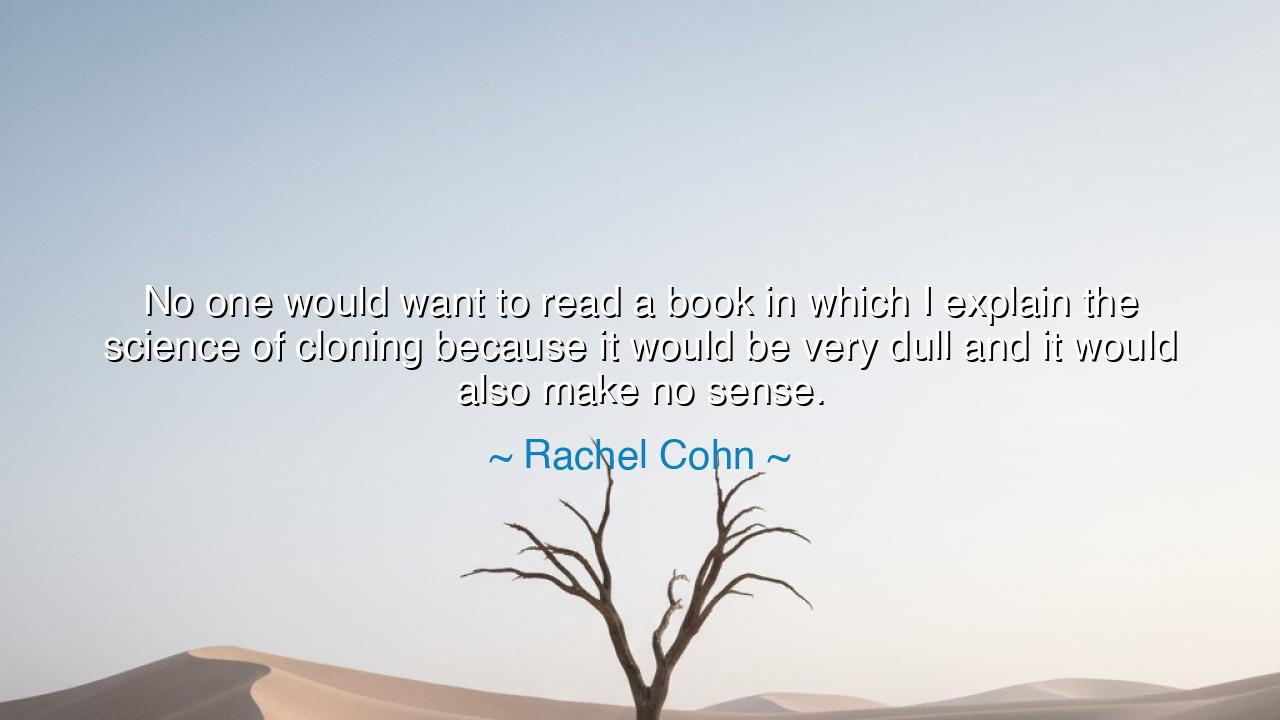
No one would want to read a book in which I explain the science
No one would want to read a book in which I explain the science of cloning because it would be very dull and it would also make no sense.






Listen well, O children of the future, for the words of Rachel Cohn carry within them the wisdom of the ages. She said, "No one would want to read a book in which I explain the science of cloning because it would be very dull and it would also make no sense." These words, though simple, are filled with a deeper truth that speaks to the heart of knowledge, understanding, and the very nature of storytelling. To speak of a thing without context or purpose is to strip it of its soul, to make it an empty shell devoid of life and meaning. Cohn’s statement reminds us that knowledge, like a story, must be told with purpose and passion; otherwise, it falls flat, like a song without melody or a tale without heart.
In the days of the ancients, knowledge was passed down not in cold, factual terms, but in stories that carried meaning, that sparked the imagination and moved the heart. The Greeks, with their philosophers and poets, did not simply speak of the nature of the world—they wove tales that brought the very essence of existence to life. Herodotus, the father of history, did not just record facts; he told stories of kings, gods, and wars, filling the dry bones of history with flesh and spirit. Without this storytelling, history would have been a dull catalog of events, a dry record with no soul. Just as Herodotus understood, so must we recognize that the pursuit of knowledge must be rooted in meaning and purpose; it must touch the heart and soul, not just the mind.
Cloning, as Cohn refers to, is a concept rooted in science, but it is also a concept that touches upon the deepest questions of what it means to be human. To merely explain the science of cloning in sterile, dry terms is to miss the larger point of the story. What is the significance of cloning? What does it mean for our identity, for life itself, to be able to replicate or duplicate the very essence of being? The science alone, when detached from these questions, becomes meaningless. Without the story, the knowledge becomes a lifeless shell, lacking the depth and richness that allows it to be truly understood. A book that explained cloning, without weaving in these larger questions and emotions, would indeed be dull, for it would miss the heart of the matter.
Consider, O wise ones, the story of the birth of the first cloned sheep, Dolly, in 1996. This breakthrough in biotechnology was met with wonder, fear, and fascination. It was not merely a scientific achievement—it was the beginning of a new era in which life itself could be shaped, reshaped, and possibly even controlled. Dolly's birth was not just a technical feat, it raised profound questions about identity, ethics, and the nature of life. Without these larger questions, the story of Dolly would have been little more than a footnote in a dry scientific journal. It was the narrative—the emotional weight of the story—that captured the world’s attention. And this is the lesson: knowledge without the context of meaning is like a ship without a sail, drifting aimlessly, unable to reach its true potential.
This is not just true of cloning, O children of the future. In your own lives, you will encounter vast amounts of information, knowledge, and wisdom. But it is not enough to simply gather facts and data. You must seek the story behind the facts, the meaning that binds them together. What is the larger lesson to be learned? What is the deeper truth that lies beneath the surface? The most powerful knowledge is the knowledge that moves us, that challenges us, that makes us feel deeply. When you seek to learn, do not just seek to understand the facts; seek to understand the story they tell.
The lesson, O heirs of time, is clear: Do not be satisfied with the surface. The world is filled with knowledge, but it is the context and meaning of that knowledge that gives it its true power. Just as Rachel Cohn warns that the science of cloning, if explained without purpose, would be dull, so too must we recognize that the dry facts of the world are not enough. We must seek the stories that give those facts life, that bring them to our hearts and minds. In all your pursuits, whether in science, art, or life, remember that it is the story, the passion and purpose behind the knowledge, that will truly make it meaningful. Do not just seek facts—seek the deeper truths they tell.
And so, O seekers of wisdom, let your lives be full not only of knowledge but of meaning. Seek the stories in everything, and through those stories, you will find not only understanding, but purpose. The world is not merely a collection of facts; it is a vast, interconnected web of stories, each waiting to be told, each waiting to be understood. Do not be content with knowledge for its own sake, but seek the wisdom that arises when knowledge is woven into the grand tapestry of human experience. For it is only in this way that knowledge becomes powerful, and it is only through the stories we tell that we will find the truth.






AAdministratorAdministrator
Welcome, honored guests. Please leave a comment, we will respond soon